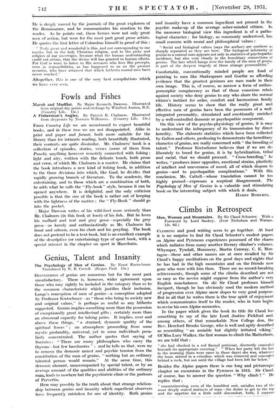Genius, Talent and Insanity
The Psychology of Men of Genius. By Ernst Kretseinner. Translated by R. B. Cattell. (Kogan Paul. 15s.) DEFINITIONS of genius are numerous but for the most part unsatisfactory. There is, however, wider agreement upon those who may rightly be included in the category than as to the common characteristic which justifies their inclusion. Lange's conception of men of genius—a conception adopted by Professor Kretschmer—as "those Who bring to society new and original values," is perhaps as useful as any hitherto suggested. Genius implies something more than the possession of exceptionally great intellectual gifts ; certainly more than an abnormal capacity for taking pains. It implies, over and above these things, " a strained, dynamic quality of the spiritual forces " ; an atmosphere proceeding from some mystic profundity, universal, yet in some individuals pecu- liarly concentrated. The author quotes that saying of Socrates : " There are many philosophers who carry the thyrsus—but few bacchantes ; and he tells us that, were we to remove the demonic unrest and psychic tension from the constitution of the man of genius, nothing but an ordinary talented person would remain." At the same time, this demonic element, unaccompanied by special talent, or by an average amount of the qualities and abilities of the ordinary man, leads to nowhere but the psychiatric clinic or the parlours of Pervertia.
Here may possibly lie the truth about that strange relation- ship between genius and insanity which superficial observers have frequently mistaken for one of identity. Both genius and insanity have a common ingredient not present in the psychic make-up of the average -sober-minded citizen. In the narrower biological view this ingredient is of a patho- logical character ; for biology, as commonly understood, has small concern with moral and philosophical values :
" Social and biological values (says the author) are nowhere so sharply separated as they are here. The biological inferiority of genius to a normal man appears not only in statistics of psychopathic incidence, but also very clearly in the hereditary connections of genius. The fate which hangs over the family of the men of genius is part of the deepest tragedy of these strange personalities."
Comfortable, conventionally minded people are fond of pointing to men like Shakespeare and Goethe as affording evidence that the greatest geniuses are men made in their own image. This is, of course, as narrow a form of anthro- pomorphic complacency as that of those conscious rebels against society who deny genius to any who share the normal citizen's instinct for order, comfort and harmonious family life. History seems to show that the really great and effective men of genius have been the possessors of a well- integrated personality, stimulated and emotionally enriched by a well-controlled demonic or psychopathic component.
On this view of the psycho-physiology of genius, it is easy to understand the infrequency of its transmission by direct heredity. The elaborate statistics which have been collected by Galton and others, professing to demonstrate the hereditary character of genius, are really concerned with " the breeding of talent." Professor Kretschmer believes that if we are de- liberately to breed for genius, it is by hybridization, tribal and racial, that we should proceed. " Cross-breeding," he writes, "produces inner opposites, emotional strains, plasticity of intellect and unevenness of mood, all of which dispose to genius—and to psychopathic complications." With this conclusion, Mr. Cattell—whose translation cannot be too highly praised—expresses a sceptical disagreement. The Psychology of Men of Genius is a valuable and stimulating book on the interesting subject with which it deals.
HARRY ROBERTS.






































 Previous page
Previous page